Editorial
The theme of our Don Bosco Calendar this year is Learning from the Young. There is so much that we can learn from young people if we are prepared to listen to them, attempt to understand them, take them seriously. At the same time we have a duty, according to our abilities, to teach them. The principal way we teach young people is by the example we set them. Don Bosco also believed that good books were important in teaching the young. What kind of books can we offer them? What kind of examples can we set before them? In Don Bosco Publications, we try to offer appropriate books according to the different ages of young people. For children we have the book 101 Saints and Special People, to which we have added a memory game, to help children remember the names of the saints. For teenagers and adults we are delighted to announce the publication of Sean Devereux. We are convinced the story of his life will appeal to the generous spirit of many young people.
We make no apology for promoting our books in this issue since Christmas is a time for giving presents, and what better present can we give a person than a book which will bring inspiration into their lives? For adults we are offering yet another new book, Prayers to Close the Day. It has already been well received by so many people who are looking for a suitable modern prayer book. Why not treat yourself to a present?
The Salesian family is a missionary family, and in this issue we tell of missionary work not only in Kenya and in Colombia, but also here in our own country.
As always, we remember those of our Salesian Family who have died recently. It was my privilege to know both Fr Paul Golding and Fr George Halton. I was by the bedside of Fr Halton when he died, for me a very special blessing.
Finally, may I thank all of you who kindly sent donations to support our Salesian work, your generosity never ceases to amaze me.
Tony Bailey SDB
Editor
Email: a.bailey@salesians.org.uk
The Spirit speaks to Young People
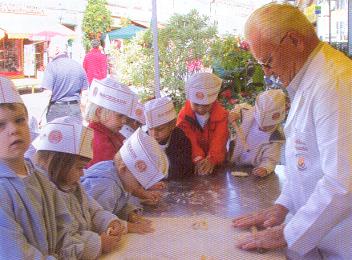 Alone in a quiet chapel in Eastern Europe, a young woman is making a retreat. Without warning she suddenly feels that she is being hugged from behind with a great tenderness. She did not move an inch because she knew that no one else was in the chapel. She had been hugged by God, she told me.
Alone in a quiet chapel in Eastern Europe, a young woman is making a retreat. Without warning she suddenly feels that she is being hugged from behind with a great tenderness. She did not move an inch because she knew that no one else was in the chapel. She had been hugged by God, she told me. On a hillside in a Mediterranean country a lorry is out of control, sliding down a narrow coastal road. It turns over and slides to a halt inches from a family car parked at a view-point on the cliff edge. Watching from the back seat of the car is a fourteen year old boy who looks up at the huge juggernaut in shock. As he looks he is overcome with a sense of God's goodness and protection for him and his family. Despite the shock he feels a great peace and safety. God's hand has moved in his life.
It is the evening before his Granddad's funeral and a young Belgian boy sits thinking about life and death. Suddenly he is overwhelmed by a feeling that everything is one and that somehow everything is God. It came with a huge sense of being loved and a strong sense of peace.
These stories emerged from a series of short conversations during a Salesian Youth event in Brussels call Eurizon in Summer 2004. There were fourteen European national Salesian groups involved. All of those interviewed were able to recount an experience that brought them close to a presence or a power in their lives that was different from their normal sense of awareness.
The young people all spoke excellent English, but they still found words failed them in this area of experience.
I felt huge as a person, as if I filled the whole world, but very small and vulnerable too,
one young person reported.
Another person said simply,
I felt like I was part of everything.
None of the young people felt they had expressed themselves clearly enough because as one said,
the experience was too big for words.
Interestingly, few of the young people had ever spoken about these experiences to anyone else. It was too intense and personal, according to some, too vague or strange, according to others. When they were shared it was more likely to be with a friend rather than a family member. The events were all experienced alone, even if others were around, and were understood as intended only for the individual concerned.
Sitting on a cliff top in Malta a young adult is moved by the beauty of the view. She is overcome too by a sense of peace and calm that seems to come from inside and soak into her from the outside. It is an experience that she goes back to when she feels low in spirit or in confidence. The girl hugged by God in the chapel finds that the memory of that experience sustains her through hard times and gives her an inner strength, a sense of partnership with God. The boy involved in the lorry accident is strengthened in his trust in God and he finds it easier to do the right thing when under pressure.
All of these young people recognise the sacred nature of these experiences that have so much in common with each other. But there were differences in the way various nationalities spoke about such moments in their lives.
Young adults from Eastern Europe were quicker to name such experiences as religious, as from God. Those from Western Europe were sometimes reluctant to put any religious label on their increased awareness. For the Eastern Europeans it seems that these experiences confirm religion, and for western Europeans the experience is seen as a challenge to religion.
For Eastern Europeans there was a strong sense of duty emerging from the experience. They came away with a sense of obligation to do the right thing, and to live morally and peacefully with others. For Western Europeans the moral and social sense was almost entirely absent, to be replaced by an intense personal feeling. They were less likely than Eastern Europeans to connect their experience to church or an external moral code.
For Eastern European youth, the Church seems to be offering a strong setting for interpreting these experiences in a religious language. The Church is seen as a trusted friend, a sustainer of people in time of war and oppression, a stable focus when government and politics are in chaos. In the west the Church is seen as well meaning but out of touch with reality for young adults. Therefore the young person seems to prefer to hang on to the vague personal nature of the experience, and is far less likely to share it with others. It is too personal to share.
For all these young people the experiences have been life changing. For one Belgian it leads her to appreciate nature, and keep searching for a sense of the sacred. For one Eastern European, the experience has strengthened his conscience to do the right thing and admit his faults more often. For another Western European youth, his sense of empathy has increased alongside a respect for nature and the environment. For another it is the challenge of coping with an illness through the energy of a dream where she is embraced by a figure of Mary the Mother of Jesus. For another it is the ability to work hard for exams, with a sense of purpose and energy that were not present before the experience happened.
If you think these experiences belong only to adolescents, think again. Listen to this experience from a six year old:
I know God is everywhere… in the morning, in the sky, in the puddles outside….God is inside me when I snuggle into bed and when I fall asleep he takes care of me.
It seems that from the earliest age we are in touch with the Spirit. The inner experience of wonder and the mystery of an inner presence are part of the inner spiritual landscape of each person. Recent research has found that these experiences begin early and often fade as soon as we begin formal education. What we see in adolescence is the re-emergence of a Spirit that has been present from the beginning.
These life-changing experiences are scattered through young lives in a way that should reassure us that they are never far from the presence of God. What they make of them depends very much on how the young people feel about their Church and culture. I will leave one of the young voices to have the final word:
I felt hugged from behind. It was so real, a real presence, that I had to look behind me to check. There was no one there. I felt so strong, so filled with life. I was connected to everything and everyone. Whatever happens to me, I know I can live from this experience for many years.
David O'Malley SDB
Email: davidomalley@lineone.net
Anyone who has had similar experiences may contact David by email.
A SALESIAN JOURNEY WORKING WITH YOUNG EX-OFFENDERS
It is nearly 20 years since I moved to Truro in Cornwall, leaving behind the active Salesian Co-operator environment of Thornleigh in Bolton, where my older children were pupils, as I had been in the early 50s. It was a strange experience, few Catholics, very rural and only four Catholic primary schools. What was I taking my family to? I had been fortunate to have had a solid Salesian upbringing, what a privilege, yet what a responsibility as I moved to relatively non-Salesian territory!
As a family we took time to settle in Cornwall. We were made very welcome, especially in the parish, as we began to help with youth work. My wife, Maria, became the County Co-ordinator for the Catholic Women's League Catechetical Camps, held each summer, mainly for those children not in Catholic schools. Maria held this post for I5 years prior to becoming the CWL Diocesan representative for the Plymouth Diocese in 2003. I held various posts with the camps from general helper to leader. All the time we felt our Salesian background was helping us to make a contribution as Salesian Co-operators, hopefully as Don Bosco would have wished us to do.
Years have gone by and we have kept in touch with the greater Salesian family. The most notable experience was taking part in the trip to Turin in I988 to mark the Centenary of Don Bosco's death. To actually stand on the spot where Don Bosco was born was very emotional. Various visits to Battersea when on business in London, and in more recent years attending the Shrigley Association reunions at Savio House, have helped to keep alive the Salesian ideals. However I always had a feeling that I could be doing more. The opportunity was to arrive, out of the blue, at the turn of the century.
I had spent most of my life in careers guidance, followed by four and a half years as Director of Fundraising for St. Julia's Hospice, run by the Daughters of the Cross in Hayle. I was then Programme Manager for Millennium Volunteers for the next five years. This all changed when I heard about a new initiative called C-FAR, Centre for Adolescent Rehabilitation, based in Devon but covering the whole of the South West. This seemed to be the answer to my prayers.
The founder of C-FAR, Trevor Philpott OBE, is an ex-Royal Marine, who wanted to do something to help young ex-offenders by providing an alternative to repeated custodial sentences. He worked on the idea for some years before it came to fruition in June 2000, with the start of the first life-change course at the Army Camp in Okehampton, the only place he could find that was willing to provide accommodation for these desperate young men, whom society in general had written off. Trevor's charisma, very much akin to Don Bosco's, inspired me to volunteer to be a mentor for the young men at the end of their course. I was immediately offered the post of part time Case Co-ordinator for Cornwall. I felt very privileged to be involved, almost at the beginning, in this new venture. It reminded me of the good work Don Bosco had done with the young prisoners in Turin. It seemed too good to be true and I felt at last I had found something where I could more easily use my Salesian background. I have never looked back!
C-FAR has now been running over four years. In that time over 300 young men have benefited from the experience. Most of them are from broken homes, where they have been abused; physically, sexually, mentally and emotionally. In several cases it is their parents who have introduced them to drugs and alcohol, which in time they have taken to excess, resulting in unfinished schooling, acts of crime and long spells in prison. C-FAR offers them a chance to change their lives and make a fresh start. This is easier said than done. It takes great effort to put aside habits of a lifetime, albeit a relatively short one at that. The staff at the new centre in Highampton, a former residential home for the elderly, are dedicated to helping the change-over to a new way of life. Care staff provide specialist support in helping them cope with their drug issues, and in finding secure housing on return to the community. They also help them find employment or training and match them up with suitable volunteers who will be their trained mentor for nine months or more, as needed.
My job as Case Co-ordinator is to meet with the young men before they come on our course, get to know them during the course of eleven weeks, and oversee the mentor/mentee relationships in the community. At the moment I only spend a few hours a week with them, as I am still involved with Millennium Volunteers. The work is absorbing but very rewarding. Over the four years I have seen our ex-trainees, as we call them, settle into employment, set up families and put behind them the crimes of their youth. The whole spirit of C-FAR is about respect for the trainees as individuals. They are given help to address their needs whether it is anger-management, parental skills, drug and alcohol dependency, or life-skills training. My own background in careers guidance comes in useful at times, as does my work with volunteers, which is a great way to build up their self esteem by helping others in the process. They follow a very full sixteen hour programme each day providing for their educational, recreational and physical needs. They eat well, and have opportunities to learn new skills such as abseiling, rock-climbing and sailing. In order to attend the course they have to be motivated and are given every encouragement to complete the course, which is voluntary. However, if they don't cooperate they are asked to leave, or they may choose to leave. They may come back again depending on why they have left.
The Centre does have a chaplain. Myself and some other staff are keen to be able to offer them something more on these lines as several of them have expressed an interest in Christianity. For some it is the first time they have given any thought to their spiritual needs. I just thank God that I have been given this opportunity to be close to them, as they face up to their life-change programme. I am grateful that I can bring some of Don Bosco's ideals to the work I do today.
Paul Barnes
Further information about C-FAR can be obtained by phoning Paul on 07748705386, e-mailing paulbarnes@hotmail.com or surfing on www.c-far.org.uk
NEW FOR CHRISTMAS
You can purchase the following publications from the Don Bosco Publications Web Site
REMEMBER YOUR SAINTS AND SPECIAL PEOPLE
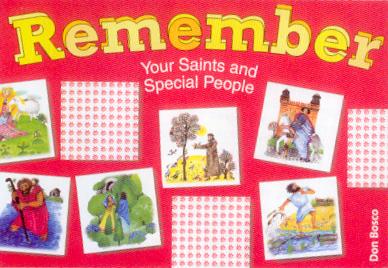
Price £5 + £2 packing & postage.
Will make an excellent Christmas present
A new and exciting memory game to learn about and remember Saints and Special People. Inside the box are 72 sturdy cards, pictures of 32 Saints. Included is a booklet of simple instructions and brief details of the lives of each Saint and can be played by all the family. This game is linked to our popular book 101 Saints and Special People. £10 + £3.45 packing & postage
Special Christmas offerBUY 1 GET 1 FREE 101 Saints and Special People PLUS Remember Your Saints and Special People Cost for £10 + £4.45 packing & postage Save Over £5 |
PRAYERS TO CLOSE THE DAY
Paperback £3.50 + £1 packing & postageWritten by David O'Malley SDB this book is a way to reflect on the day, either as a group, or to use as a personal bedside prayer book. It is based on the Prayer of the Church. The format has emerged from use in Salesian Communities, and much of the spirituality comes from the optimistic and gentle inspiration of St Fancis de Sales. It challenges us to find God's abiding presence throughout the day, by means of these evening reflections. One of the books quoted in Prayers to Close the Day is another written by David O'Malley, Via Lucis £9.99 + packing & postage £1.25
Special Christmas offerBUY 1 GET ONE FREE Via Lucis PLUS Prayers to Close the Day Cost £9.99 + packing & postage £1. 48 SAVE £4 |
Reflection
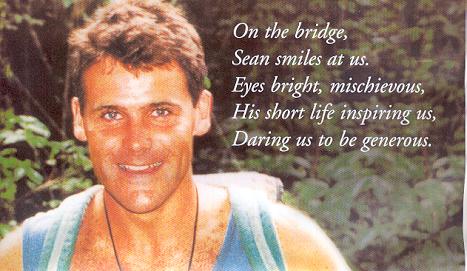
Eyes bright, mischievous,
His short life inspiring us,
Daring us to be generous.
Sean Devereux
A life Given for Africa
1964 - 1993This is the story of a young man of generosity, courage and compassion. He spent his short life working for the poor children of Africa. Service to others is embodied in his now well-known motto, While my heart beats, I have to do what I think I can do, and that is to help those who are less fortunate. Although his convictions cost him his life, his spirit lives on in the young people he worked for in Africa, and in all those who have been inspired by his life.
How appropriate the words of the former UN Secretary General, Dr Boutrus-Boutrus-Ghali:
In adverse and often dangerous circumstances, Sean showed complete dedication to his work. His colleagues admired his energy, his courage and his compassion. Sean was an exemplary staff member and gave his life serving others, in the true spirit of the United Nations. Sean was a real soldier of peace.
The Author
Michael Delmer is a Salesian Brother who has spent most of his life working for young people. He was for many years headteacher of Salesian College, Farnborough. As Sean's teacher he followed his career with great interest, and was inspired by the work he did for the children of Africa. For many years he has been collecting letters and articles about the life of Sean. He has been persuaded to bring these together as an inspirational account of a young man's achievement in the service of others. Since his retirement from teaching, Brother Michael has found a new vocation, caring for elderly Salesians in our retirement home in Bolton.A book to inspire young and old.
Price £6 plus £1 p&p
You can purchase this book from the Don Bosco Publications Web Site
Vides UK
One of the biggest joys of working or volunteering for a Salesian organisation is having the opportunity to make contact with children from a variety of backgrounds, in a wide range of places.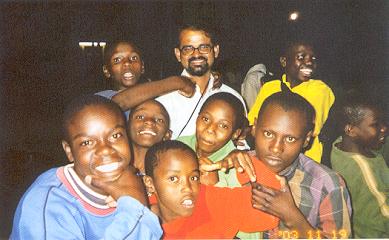 Summer 2004 saw VIDES UK return to Scotland for another year of successful camps. Twenty-five volunteers went back to Renfrew for the fourth year, while twenty-one headed to Barrhead for the second year. As a volunteer with VIDES UK I have taken part in a number of these summer camps for children in Scotland, as well as spending six months n Kuwinda, Nairobi. One of the questions I ask myself before I start each project is, How am I to make connect with each individual? Every child I meet will have had a different upbringing. In today's world, regardless of where a child is living, the Salesian approach ensures that this is always possible.
Summer 2004 saw VIDES UK return to Scotland for another year of successful camps. Twenty-five volunteers went back to Renfrew for the fourth year, while twenty-one headed to Barrhead for the second year. As a volunteer with VIDES UK I have taken part in a number of these summer camps for children in Scotland, as well as spending six months n Kuwinda, Nairobi. One of the questions I ask myself before I start each project is, How am I to make connect with each individual? Every child I meet will have had a different upbringing. In today's world, regardless of where a child is living, the Salesian approach ensures that this is always possible. To prepare for working with the children and young people, VIDES UK volunteers attend a training weekend. Each morning, the volunteers have a formation session. This year the volunteers on the camps were challenged to look at the way we interacted with the children and young people. There was a focus on two main themes. Firstly, the idea of shared leadership. Secondly, what was termed Salesian Presence (See Box 1). The volunteers were challenged to think of qualities that would enable them to work in a Salesian way with the children.
These values were used so that on the camps an environment was created in which the children felt safe, respected and welcomed. This method guaranteed that every child was made to feel part of the group and that they had something to offer. For example, while it may sound obvious, making an effort to learn the names of the children made them feel much more welcome.
The camps that VIDES UK currently run in Scotland last ten days and this year around 350 children and young people attended. As training provided for the volunteers, there is also a theme for the children. Each year the theme is different. This year it was A Different Beat to our World. To incorporate this, the camps took on a slightly different format with the creation of new activity zones. These activity zones focused on three main areas; Friendship, Respect and Our World. During these sessions the children take part in games that have a message, which helps the child or young person think about the world around them. The aim was that this would bring an informal but more educational side to the camp. The sessions used this year were designed to help the children and young people think about the world they live in and learn more about ideals such as freedom, equality and tolerance.
Having a theme is all well and good, but it is important to make it relevant to the children attending the camp. During my stay in Kenya, I was on the organising committee for a camp that would bring children together from all over Nairobi. One of the biggest problems vulnerable children face is drug abuse. We decided that the best way to convey our message was to use the simple slogan Say No to Drugs. The children and young people attending the camp in Nairobi were challenged to think of short plays and songs which conveyed this message in an effective way. In this environment it was more beneficial to present the children with the message itself. Whereas in Scotland we left the children to develop the message and think about what it meant for them. This was mainly because the children in Kenya clearly face different pressures and situations in daily life from those in Scotland. In Kenya it was important to focus on the children's own lives, and the immediate problems they face, whereas in the more materialistic world of Western Europe, we chose to focus on challenging the children and young people to think about how their actions affected people all around the world.
The camp in Kenya only occupied a short period of my stay. Bosco Boys is a project for children in need, and many of the children come from very difficult backgrounds. Some will have not have had a loving home; some will not have had a place to study, let alone a place to stay. The Bosco Boys project uses Salesian values, involving the children and young people, and listening to them. They are provided with a place to learn, somewhere to sleep, opportunities to learn new skills that will help them later in their lives, giving them a safe and secure place to play. This is done in an environment that is caring, understanding and provides them with happiness and love.
The environment and atmosphere we try to create during the summer camps in Scotland is similar. For this to work it is important that a good atmosphere is created amongst the volunteers as a group. So while this idea of Salesian Presence was at the forefront of all the work, an important part of the camp was how the volunteers interacted amongst themselves. We found that the children quickly pick up on what we say, and do so it is important to set a clear example. If we listen to one another, support one another and encourage one another we can begin to respect one another. This is one of the reasons why the camps in Scotland have been successful over the years. As we build Salesian values in our own community of volunteers it becomes easier to adopt the same attitudes with the children and young people. Essentially, it doesn't really matter where you are in the world, working with children and young people is challenging, fun and rewarding. Whether that child grows up in Scotland or in Kenya, our Salesian values can help to create an environment that allows them to grow, learn, play and feel loved and welcome, which ultimately is the right of every child.
Saviour of the street children
From: The Catholic Herald, Sept 10, 2004
Colombia's street children live in fear of pimps, who will force them into prostitution, and death squads. But a Salesian priest has made it his life's mission to protect them.
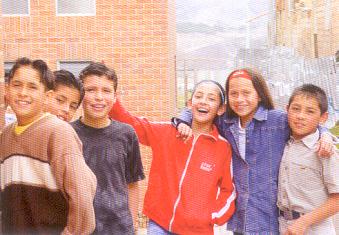 In an eastern neighbourhood of Bogotá lies an oasis of tranquillity and hope. Hidden behind high walls and barbed wire, the United Youth Centre is a haven for 180 girls who used to live on the streets of Colombia's capital city. Entering the shelter's glistening courtyard, large murals painted by the girls decorate the surrounding walls. Carefully tended flower beds and tumbling bougainvillea adorn the corners of the courtyard. On the playground floor, colourful linen and towels are spread out to dry in the morning sun. In the kitchen, huddled around a huge cooking pot, two young girls are helping the cook to peel potatoes for the midday lunch. Upstairs in the comfortable dormitories, teddy bears lie on neatly made bunk-beds. Further along the passageway, the technology workshops and computer rooms are hubs of activity.
In an eastern neighbourhood of Bogotá lies an oasis of tranquillity and hope. Hidden behind high walls and barbed wire, the United Youth Centre is a haven for 180 girls who used to live on the streets of Colombia's capital city. Entering the shelter's glistening courtyard, large murals painted by the girls decorate the surrounding walls. Carefully tended flower beds and tumbling bougainvillea adorn the corners of the courtyard. On the playground floor, colourful linen and towels are spread out to dry in the morning sun. In the kitchen, huddled around a huge cooking pot, two young girls are helping the cook to peel potatoes for the midday lunch. Upstairs in the comfortable dormitories, teddy bears lie on neatly made bunk-beds. Further along the passageway, the technology workshops and computer rooms are hubs of activity. Fr Javier de Nicolo left his home in Bari, Italy, 53 years ago to fulfil the missionary ideals of Don Bosco. Since then, Fr Javier has dedicated himself to running shelters for street children in Colombia; he has been head of the United Youth Centre for the last 22 years. In his office hangs an enlarged map of south Bogotá. The map is colour-coded and well-annotated, showing the key streets, squares and neighbourhoods where the majority of the street children are most likely to be found. Almost every night, Fr Javier and his volunteers scour the streets of South Bogotá in their van, scouting for homeless and abandoned children who have made these streets their precarious home. The children are to be found sleeping in doorways, washing in the public fountains and roaming about under the protection of local street gangs. Some earn money as occasional street vendors, beggars and thieves. Others, particularly girls, earn a few measly pesos through prostitution. 'If you imagine Charles Dickens's Oliver Twist then you will get a good idea about what we see on the streets, except this happens today in Bogotá rather than in London,' remarks Fr Javier.
The process of inducting the street children, the gamines, into the shelter is long and gradual with distinct stages. The children are understandably cautious and it usually takes between two to three months for a new recruit to be fully and permanently integrated into the shelter's programme. Fr Javier and his team first work with the gamines on the streets. 'We don't just grab them and place them in the van and cart them off to the centre,' he says. Initially, he tries to gain the confidence and trust of the boys and girls. This can involve providing food, drink and warm clothes at the same time and place each day. 'At first a kid may be curious but is still suspicious of us,' he says. 'We then start talking and hanging out with them. Sometimes it is just a simple thing, like bringing a football and playing with the kids in the street until the early hours of the morning.'
Once trust between Fr Javier and the gamines has gradually been established, a friendship and interdependency starts to evolve. 'It's at this stage that we start talking about the centre and introducing the idea that we can help get them off the street for good,' he explains. Even then some gamines do not automatically become full-time residents of the shelter. At the beginning, some street children just prefer to drop into the centre to get food and a shower. After several weeks, Fr Javier starts to introduce some boundaries and obligations which the gamines have to follow. 'I might say, to get what you want from the centre you have to arrive at 7 am sharp every day,' he says. Fr Javier likens this process to, crossing a river with a very fragile barge. Upon arrival, the girls are given food, new clothes and a haircut. A mentor, usually an older girl who has been living in the shelter for at least six months, is assigned to each new recruit. A typical day starts at 5.40 am with morning prayers. A duty rota means that all girls contribute to the daily running of the centre. Household duties include washing linen, cooking, tending the garden and cleaning the dormitories. Once the daily chores are completed, the school day begins.
In typical Salesian tradition, there is a heavy emphasis on theatre, art and music and the teaching of practical skills such as ceramics and sewing. There are frequent trips outside the centre, to the zoo and adventure parks. Many of the girls forced to seek refuge on the city streets are victims of child abuse and domestic violence. The majority come from single parent families. Children flee from broken homes because very basic things are not being provided at home, notably regular meals and, more importantly, parental love. In Colombia there are far fewer girls on the street than boys. Out of every 100 street children, approximately six are female. According to Fr Javier, girls tend to stay at home longer than boys because they are more useful around the house. He said: 'Mothers and daughters form tighter bonds because they wash, cook and look after younger children together. Whereas boys tend to spend more of their time outside the home, where they quickly get involved in drugs and gangs.' The educational philosophy of the Salesian missionaries permeates the shelter. Don Bosco wrote: 'Authority, supported by reason and not by impositions which, however just in themselves are not understood as such, this is the great educative principle to which the child submits willingly, with pleasure and good results.'
Fr Javier epitomises these teachings and believes that nurturing a child with force and punishment is detrimental to his or her development. Instead, he tries to instil a sense of discipline through love, praise and rewards. 'There are few rules in the centre,' he says. 'I'd rather give them freedom than take it away.' The focus appears to be giving the children the unconditional love that they did not receive from their own families. Fr Javier is upfront about spoiling the children: 'If a child wants an ice cream they can have it,' he says. 'If they prefer to play football rather than basketball they can. The most important thing is to see a smile illuminate a child's face.' Walking around the centre, it is clear that his approach is working. The success of the project is evident in the joyful spontaneity and enthusiasm of the girls. Ten-year-old Daniela rushes across to me, eager to show off the centre's facilities and the music room. 'I've been in the choir for the last three years,' she beams. Lina proudly displays the clothes that she has made: 'The blue skirt that I'm wearing I made myself and I made three blouses and two more skirts just this year,' she says.
The work of the missionaries is not clear-cut. Fr Javier believes that they are still battling against erroneous cultural attitudes that were common during Victorian Britain. 'People, and even the state, sometimes still think that poverty is caused by laziness and apathy,' he explains. Despite these barriers, the work of the Salesians has flourished since the first missionaries arrived in Colombia in 1890. Today, the organisation has grown into a high-profile, slick operation funded by private donations mainly from Colombia, Switzerland and Italy. There are now 104 shelters around Colombia. In Bogotá alone there are 30 centres caring for 7,000 street children. The programmes have received attention from the media and attract celebrities and politicians. Mother Teresa spoke of St John Bosco she said: 'He knew that whatever he did for the street children, he did for Jesus, and this was not just an act of faith, but a real conviction.' The work carried out in the United Youth Centre, closely follows the convictions of Don Bosco who himself gave shelter, education and jobs to the abandoned children of Turin in Italy. In the late 19th century, Don Bosco had dreamt of missions to Latin America to help lepers and the poor. The efforts of Fr Javier and his tireless volunteers are a testament to both his dream and legacy.
Anastasia Moloney
The Spirit Calls
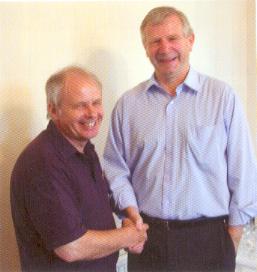 In early January, after the retreat programme had resumed in Savio House, I slipped away to Provincial House, Stockport, for a few days to enjoy a brief Christmas break. A knock at my door in the late afternoon disturbed my somnolent reading. It was Francis, the Provincial. You need to phone Rome, he said. My heart sank. I suspected that it probably had nothing to do with a climbing holiday in the Dolomites. So I duly phoned Fr Albert, our Regional Superior. He informed me that the Superior General wished to see me. I replied that I’d consult my diary and see if I could go the following week. No, Michael. Tomorrow! So the next day, the day on which dear Fr Tom Carroll passed away, I reached Rome late in the evening. Fr Albert met me at the airport, and drove me to the Pisana, gently informing me that my meeting with Fr Pascual Chávez was scheduled for 8 am! I didn’t get a lot of sleep that night The next day Fr Chávez asked me to become Provincial of the GB province, and I accepted, a responsibility I had accepted eighteen years ago, for a six year period.
In early January, after the retreat programme had resumed in Savio House, I slipped away to Provincial House, Stockport, for a few days to enjoy a brief Christmas break. A knock at my door in the late afternoon disturbed my somnolent reading. It was Francis, the Provincial. You need to phone Rome, he said. My heart sank. I suspected that it probably had nothing to do with a climbing holiday in the Dolomites. So I duly phoned Fr Albert, our Regional Superior. He informed me that the Superior General wished to see me. I replied that I’d consult my diary and see if I could go the following week. No, Michael. Tomorrow! So the next day, the day on which dear Fr Tom Carroll passed away, I reached Rome late in the evening. Fr Albert met me at the airport, and drove me to the Pisana, gently informing me that my meeting with Fr Pascual Chávez was scheduled for 8 am! I didn’t get a lot of sleep that night The next day Fr Chávez asked me to become Provincial of the GB province, and I accepted, a responsibility I had accepted eighteen years ago, for a six year period. The irony of the situation brought a wry smile to my lips. In the run-up to Advent and Christmas, I had given a number of talks and lectures in different parts of the north of England on the God of Luke’s Gospel (since this year is the year of Luke in the Sunday lectionary). I described Luke’s God as the God of Surprises and of Faithful Love. God suddenly and unexpectedly breaks into the lives of the human protagonists in the drama: Elizabeth and Zechariah, Mary, the Shepherds. That intervention turned lives upside down. It seemed to me that the God of Surprises had struck again! So much for the dream of accepting the repeated invitation of the Australian Provincial, to go to Melbourne for a year as lecturer in New Testament studies, with the permission of the new Provincial, of course!
Another feature of the Lukan Infancy Narrative is the activity of the Spirit. The Spirit is clearly present with each of the characters, including Simeon and Anna in their later years. The Spirit’s role is to enlighten, to bring new life, to transform, to reassure, to be a source of joy. In responding to my fiat of acceptance, Fr Chávez reminded me that the Spirit would always be with me, and he invited me to be sensitive to the Spirit’s voice and direction.
So it was with hope and optimism, as well as anxiety and misgivings, that on August 20th this year I took over from Francis Preston the responsibility for the leadership and animation of Don Bosco’s mission in Britain. Although there are fewer SDBs than there were 18 years ago, fewer communities, also the average age is higher, and Liberia no longer part of the province, the Province he handed on is alive and developing. The youth of today need Don Bosco more than ever. And we have, I believe, more lay people than before who are deeply committed to sharing this mission – and that is central to Don Bosco’s original inspiration. There is a longing amongst more and more people, young and not so young, to understand better and live more fully Don Bosco’s Gospel Way, his spirituality. The Spirit is stirring, and new things are emerging amongst the ongoing activities. I feel enthusiastic and excited, and I know that it is a privilege to be of service at this moment in history.
Michael Winstanley SDB Provincial
Author of Don Bosco’s Gospel Way
Fr Paul Golding SDB
1920 - 2004
 Paul was born in Streatham, South London in 1920. He was sent to the Salesian College in Battersea in 1931. He was intelligent and hardworking. Paul enjoyed the school life at Battersea and decided to join the Salesians at the end of his schooling.
Paul was born in Streatham, South London in 1920. He was sent to the Salesian College in Battersea in 1931. He was intelligent and hardworking. Paul enjoyed the school life at Battersea and decided to join the Salesians at the end of his schooling.Paul studied at Beckford, followed by practical training at Cowley. Paul’s Salesian life was disrupted by the war. He took his final vows in 1946, and was ordained Priest in 1950.
Paul spent the next 49 years in Chertsey. He made an immense contribution to the school and apostolate of the community. He taught science in the school for 35 years and was deputy head for twenty years. On retiring in 1985 he took on the role of community bursar. He worked tirelessly as convent chaplain at the Hospitallers of the Sacred Heart at Addlestone for more than 40 years, and would set off on his bicycle or walk in the snow to be there to say Mass for them before beginning his day in school. He also organised the Parish SVP and was chaplain to SVP groups across the deanery. Paul had strength of character and a big heart that was sometimes hidden by his gruff manner.
Paul’s latter years were marked by mobility problems. His hips began to give increasing pain and his limp became more and more pronounced. Paul has now gone to his reward. His life was definitely marked by the shadow of suffering and the cross. Every day Paul celebrated that mystery of faith. His life was one of consistent and persevering service of young and old.
John Dickson SDB
Fr George Halton SDB
1911 - 2004
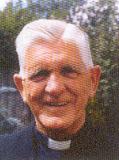 George was born in Pemberton, Wigan. While he was still young the family moved to Clayton-le Moor. His father died when he was only 11 years old. George started work early in life in a foundry where he earned 12 shillings a week. As a boy he was an altar server in the local church. In his late teens he and his friend the young Christopher Gorton joined the Knights of St Columba. Both young men decided to join the Salesians.
George was born in Pemberton, Wigan. While he was still young the family moved to Clayton-le Moor. His father died when he was only 11 years old. George started work early in life in a foundry where he earned 12 shillings a week. As a boy he was an altar server in the local church. In his late teens he and his friend the young Christopher Gorton joined the Knights of St Columba. Both young men decided to join the Salesians. George was ordained in July 1946 at Blaisdon. He spent some time teaching at Burwash. He was then secretary to the Rector of Battersea. He worked in several houses including Shrigley and Cowley, He was at Henley as chaplain to the Salesian Sisters. After sixteen years at our provincial office in Oxford he finally came in 1986 to Bolton. In 1998 he became a founder member of the new house of St Joseph's.
George always spoke warmly of his family, a significant blessing that has lasted his lifetime. A family that has always been there for him. I could not adequately express the love his family has shown George, a gift so precious in his life.
George was no stranger to suffering, he had shingles about 10 years ago and the residue pain continued for the rest of his days. When he had to go to hospital in late April of this year he did so without complaint.
George was basically a very shy person. He always kept himself in the background. George loved the liturgy, and many a time he corrected me as I was leading the Mass in St Josephs, when I had forgotten a Creed or a Gloria. A magisterial voice would be heard from the back row, CREDO. And I always obeyed. George lived for his priesthood, George loved his priesthood.
Visiting someone who is dying is not an act of kindness but a privilege. I was privileged to see the love Vivien and Christine, his nieces, had for their uncle, and when you see someone loved you catch a glimpse of the real person they love. In that short time I spent by George together with them, it seemed that we went back into time to their childhood, and George once again the young priest they were so proud of. Can I forget that gentle smile he gave me when I entered his room at Hazelbrook Nursing Home, or that bright twinkle in his eyes?
May he rest in peace.
Tony Bailey SDB